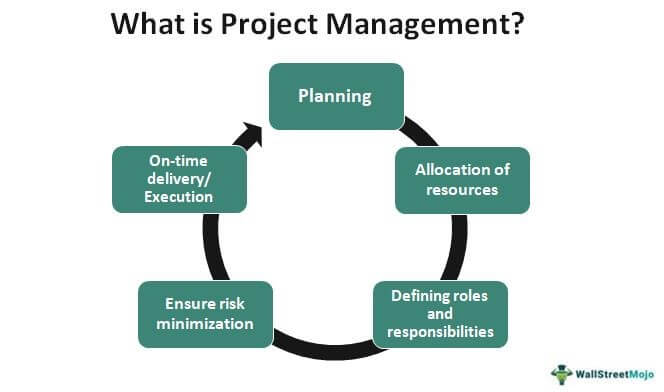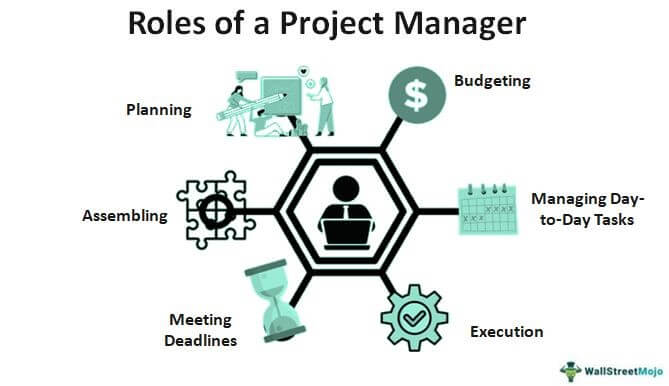Table Of Contents
What Is Project Management?
Project management means planning and executing a task by allocating resources across stages and departments. These skills are highly valued in corporate and government project executions as they ensure efficiency, risk minimization, on-time completion, and delivery. In addition, it helps an entity meet standards and quality expectations.

Project management corroborates various advantages of fulfilling a project on schedule and within budget. Project management skills involve many processes in between planning and execution. A project manager ensures the tasks of assembling stakeholders, retaining technical knowledge and expertise, defining roles and responsibilities of the team, and meeting deadlines while aiming to achieve simultaneous objectives.
Key Takeaways
- Project Management refers to the methodology or philosophy of allocating resources to achieve higher efficiency and success rate.
- Ideas, goals, or purposes drive the first step to managing projects. It ensures the team is working as one unit towards a common goal.
- Project management is of various types, such as waterfall, lean, agile, or the Japanese Kanban technique.
- The Kanban technique, for instance, promotes the visualization of tasks and goals for a better understanding of the workers.
- A project manager works as a binding force in an organization to ensure the completion and execution of projects.
Project Management Explained
Project Management is a type of management and leadership technique that is specific from industry to industry or can be intrinsic for each enterprise. It also depends on the project size and stages. Usually, with increasing stages of project execution, the number of personnel working on a project may increase due to division of labor and specialization needs.
For example, in the IT industry, for software project management, more personnel might be required in marketing than in developing a particular software. However, when considering the example of construction project management for an apartment building, more and more persons are required on the ground for building and construction and quality control checks than in marketing the same real-estate project.
An important factor beneath managing all project management tools is the role of a project manager. A project manager functions like the centralized hub in a hub and spokes model, who leads the project execution with day-to-day tasks and long-term vision.

A project manager’s role ensures effective communication across different stages and departments. In addition, the project manager is sometimes the sole communication thread between an organization and its clients. For example, while constructing an office building for a law firm, a project manager will simultaneously coordinate between specific requirements of the client and, at the same time, check with his team for the budget and time constraints, if any.
Thus, among the project management duties, the importance of a team behind a project execution ensures budgeting, scheduling, making charts for meeting deadlines such as the Gantt Chart, and forecasting risks and hurdles in the process. At the same time, such a team aims to establish compliance with company standards and client expectations. Consequently, the role of a project manager binds all these processes together for smooth movement and completion of tasks.
Types
The basis of project management types depends on the task and resources available such as time, money, persons available for the job, etc. However, a few classifications for managing projects and their execution of the project management duties are as follows:
#1 - Waterfall
This technique ensures one task’s completion before the next task begins. As the name suggests, it works like a waterfall wherein a team of workers complete the job first in line and cannot proceed further until it finishes. For example, editing a piece of content is a follow-up task to writing first.
#2 - Agile
In agile project management, completing tasks is independent of the predecessor and successor stages. As a result, a team can work at the pace required and incorporate changes instantly at any stage if any issues arise in the chain of events. For example, multiple tests and trials help improve the technology while developing any software.
#3 - Lean
Under this management model, a team can aim to become more efficient by reducing costs, minimizing waste, and maximizing customer satisfaction. A team can start by charting out tasks step by step and detect any wastage of resources such as time and money. This method can also work best to fasten delivery and maximize output in limited resources. For example, if a labor shortage arises or raw materials become scarce in case of an energy crisis.
#4 - Kanban
It is a Japanese method of managing projects which aids in planning every step of the project on a visual board, also known as a Kanban board. This methodology of project management process is useful for organizations aiming to tackle challenges while revamping their business models. It gives a core and flexible outlook to cope with potential risks and clinch opportunities.
Skills
Let us learn about the various skills of project management professional in details.
- Communication – Good communication is the key to success in any role. It is necessary to possess the ability and confidence to be able to put across points of importance and even listen to the suggestions and ideas gives by others in the process. A project manager should have good written, verbal and listening skills.
- Leadership and planning – A great sense of leadership is necessary to lead a team of people where each have their own style of working and own strength and weaknesses. Leadership skills help coordinate and merge individual objectives into a common goal by setting clear expectations and providing guidance to achieve them.
- Time management – Managing time is of utmost importance because if work is not done within the limited time, then it is not possible to complete any project smoothly. There should be proper usage of time, prioritization of task and the urge to complete work within the deadline.
- Risk handling- Every project of business process involves a certain amount of risk. It may be related to internal reason like finance, operation, resource, etc or external which are changes in regulation, political or economic factors, etc. A good project management will involve evaluation of forecasting such risk levels and designing strategies accordingly.
- Problem solving- Problem solving skill requires identification, handling and resolving conflicts and issues methodically so that the solution is permanent and long term. Correct decision making with good experience and knowledge is important.
- Adaptable – The project management professional should be able to adapt and adjust themselves in any kind of environment and people. They should be flexible because situations cannot be predicted all the time.
- Critical outlook – This kind of management requires critical thinking, analysis of situations and effective decision making that will help the project to go forward and achieve the objective.
- Software tools – Learning various software tools is another skill and requirement in today’s world. Various software packages and tools that help to organize and get the work done faster, should be a part of learning process.
Thus, the above are some of the skills that are required to make the process efficient and effective.
Examples
Let us look at a few examples of managing projects in different industries.
Example #1
Betty is heading a team of 10 people for the social media marketing of a clothing brand. The chain of events involves:
- Procurement of products.
- Shipping the products to customers and influencers.
- Scheduling posts and blogs.
- Sharing the content of the posts with content writers.
- Sharing the final content on social media platforms.
Thus, Betty, the project manager, ensures that her team can remain efficient at each step by pursuing a waterfall management approach of the project management process. She sets the task for the procurement team first, while the shipping team takes the next task of ensuring products reach the customers and influencers. The next step would be for the content team to get posts from influencers and popular customers for social media posts.
Example #2
Toyota Production System (TPS), also known as lean management, has been one of the world’s greatest manufacturing stories. It pioneered this philosophy in 1938 in Japan and evolved the technique of managing projects over time. Its methodology, such as the Kanban technique, has become increasingly visualized and is used today to help in manufacturing efficiency and reduce waste in the process. Like in kanban, the tasks are given visual representation to help workers understand the process better and achieve targets on time from start to finish.
Steps
A few basic steps to project management are,
- Initiation – It involves creating a business idea, goals, and purpose.
- Planning – This step involves charting and scheduling, defining the scope, roles, and responsibilities.
- Launch and Execution – It refers to allocating and managing the resources.
- Performance check and control – This step ensures quality check, compliance, tracking costs, and efforts and looks for any risks or faulty errors.
- Completion or handover – A final step to the project involves approving and documenting results and, at the same time, handing over deliverables or end-product.
Benefits
Some important benefits of the project management process are as follows:
- A good project management process helps the organization achieve the objective of the project in a systematic manner.
- It leads to better time management and efficient use of resources without any wastage of resources related to the project.
- Effective management of projects will help in controlling cost and minimising risk related to external and internal factors, so that the project can be completed effectively and on time. PMP certification ensures that project managers have the right tools to identify risks, improve communication, and optimize resources, ultimately leading to the successful completion of projects.
- The project management system also has the aim of identification, management and minimising of risk related process so that the operations related to the project and overall organization can be run smoothly.
- The communication and decision making levels can be enhanced so that project related data and information is obtained from authentic sources leading to customer satisfaction, resource optimization and well informed decisions that leads to progress of the project.
Thus, a structured and methodological approach to the project ensures its success and the organization becomes successful and effective as well as adaptable.
Project Management Vs Product Management
Both the above are two distinct roles within any organization. They have their own responsibilities, objectives and functions. Let us study the differences between them.
- The scope of the project management system is the management of projects that are going on within the organization, whereas the latter deals with the management of products and product lines that may be short or long-term.
- The main factors involved in the former is strategic decision-making, resource allocation, planning, budgeting, etc whereas the latter involves factors like market share, revenue and sales growth customer satisfaction, etc. which will lead to growth of the entire business in the market.
- The role and responsibility of the project manager is limited to the scope of the project and time duration for which it is suppose to work. Once the objective is achieved, the project comes to an end. But for the latter, the process is ongoing and involves continuous innovation, upgradation and monitoring.
- The stakeholders of a project are mainly the ones who will directly benefit from the same which are more of internal. But product management involves both internal and external stakeholders, who help in closing the gap between the customers and business, by understanding the market demand, consumer taste, preference and ultimately aligning the goal of the organization with the need of the market.
Therefore, the above are some important differences between both business concepts that together lead to successful working of the business.
